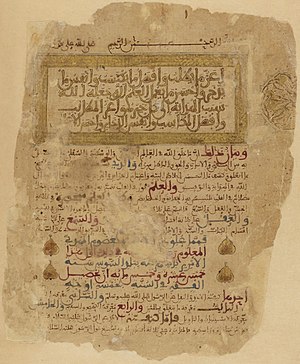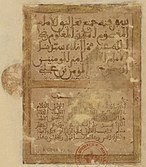Aʿazzu Mā Yuṭlab
 | |
| Original title | أَعَزُّ مَا يُطْلَب |
|---|---|
| Country | Almohad Caliphate |
| Language | Arabic |
| Subject | hadith, fiqh, usūl ad-din, tawhid, politics, jihad, reform |
| Genre | Manifesto, Aqidah |
Aʿazzu Mā Yuṭlab (Arabic: أعز ما يُطلب, lit. 'The Dearest Quest'), also known as al-ʿAqīda (العقيدة, lit. 'The Creed'),[1] is a 12th-century book containing the teachings of Ibn Tumart, self-proclaimed Mehdi and founder of the Almohad movement.[2] According to the text of the book itself, it was compiled by a scribe to whom Abd al-Mu'min dictated his notes from Ibn Tumart's teachings.[3][4]
Content
Aʿazzu Mā Yuṭlab contains a variety of topics, commentaries, summaries, and essays representing the foundation Ibn Tumart's movement.[4] It deals with hadith, fiqh, usūl ad-din, tawhid, politics, jihad, calls for reform, and promoting beneficence and discouraging maleficence. [4]
At the basis of Ibn Tumart's message and teachings is the concept of "tawhid," from which the Almohads got their name: al-muwaḥḥidūn (المُوَحِّدون).[5][3]: 246
Editions
al-ʿAqīda was translated into Latin by the deacon Mark of Toledo in 606/1209–10, after Almohad military successes in al-Andalus, especially the Battle of Alarcos.[1]
The Hungarian Orientalist Ignác Goldziher studied the book and published an introduction to an edition published in occupied Algeria in 1903.[7]
The original text is preserved in two manuscript copies, dated 579/1183 and 595/1199.[1]
References
- ^ a b c "Ibn Tūmart". Encyclopaedia of Islam, THREE. doi:10.1163/1573-3912_ei3_com_32275. Retrieved 2022-10-20.
- ^ Norris, H.T. (October 2011). "Ibn Tūmart and the Almoravids: 'The Evil Deeds of the mujassimūn from Kākudam', Selected Passages from Ibn Tūmart's Aʿazz mā yuṭlab". Journal of Qur'anic Studies. 13 (2): 155–164. doi:10.3366/jqs.2011.0027. ISSN 1465-3591.
- ^ a b Bennison, Amira (2016). Almoravid and Almohad Empires. Edinburgh: Edinburgh University Press. p. 99. ISBN 9780748646821. Retrieved 19 October 2022.
- ^ a b c Ibn Tūmart, Muḥammad (1997) [originally recorded approximately 1130]. Abū al-ʻAzm, ʻAbd al-Ghanī (ed.). Aʻazz mā yuṭlab. Rabat: Muʼassasat al-Ghanī lil-Nashr. ISBN 9981-891-11-8. OCLC 40101950.
- ^ "7. Fiqh". Brockelmann in English: The History of the Arabic Written Tradition Online. doi:10.1163/97890043200862542-8098_breo_com_122070. Retrieved 2022-10-20.
- ^ Bongianino, Umberto (Feb 8, 2018). The Ideological Power of Some Almohad Illuminated Manuscripts (Lecture).
- ^ Goldziher, Ignác; Ibn Tūmart, Muḥammad (1903). Mohammed ibn Toumert et la théologie de l'Islam dans le nord de l'Afrique au XIe siècle. Alger: P. Fontana.

